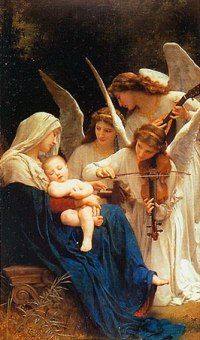 New Advent provided the link to this intriguing essay on the exegesis of Genesis 1 by Fr. Jaki at the Homeletic & Pastoral Review website.
New Advent provided the link to this intriguing essay on the exegesis of Genesis 1 by Fr. Jaki at the Homeletic & Pastoral Review website. I found Father's comment on creation as being ordered like a big Jewish tent or tabernacle very interesting & worthy of much more consideration. His comment on the the Exile & the contrast between the Jewish cosmological view & that of the pagan nations seems to me to be the fundamental key to gleaning understanding from Genesis 1.
The Holy Father, Pope Benedict XVI, seems to agree. As Cardinal Ratzinger, he wrote a book called In the Beginning, in which he makes heavy reference to this contrast of cultural world views as the canvas on which the Jewish epic of creation is painted. Soon, I will give a review of this brief, but dense book. It will also be interesting to see what comes from the recent ecumenical gathering in Rome (I believe) to study & discuss Genesis.
However, I am a bit befuddled by this bit of the concluding paragraph, almost certainly because I haven't taken the time to re-read the article & given the appropriate thought that serious writing requires. Nevertheless...
"No theological defense of the strict createdness of all can, however, be made without a defense of Genesis 1. It should not be defended under any circumstances as a cosmogenesis, with any reference, indirect as it may be, to science. Its genuinely biblical meaning can, however, be fully defended by that reason whereby, as Genesis I tells us, man is created in the image of Almighty God."
Now, I thought the point Fr. Jaki was making was to invoke "logike latreia," to find the harmony of the truth of Scripture (which comes from the hand of God) with the truth of the observed universe (which comes from the hand of God), though obviously not to explain the scientifically observed universe specifically by means of the scriptural texts. Still, at some level, the two truths have to coincide with or compliment one another, as they both come from the author of Truth. So the specific comment proscribing any reference to science in interpreting the passage seems oddly limiting of something that inherently defies limitation.
...
With some hesistation, I mention Fr. Jaki's observation that Creationists - those who believe in a literalistic, day-bay-day account of creation - inadvertently drive people away from the faith to which they desire to bring them. People may not know about particle physics or cosmic background radiation, but people do know that if physicists & cosmologists are wrong about matter & its behavior, then their computers, wristwatches, microwaves, nuclear power (& bombs) & cell phones wouldn't work either. The same science that indicates a universe 14 billion years old simply cannot be dismissed out of hand. One discredits himself on the spot to demand that either an error of the magnitude 6,000 versus 14,000,000,000,000 has been commited or that there is a universal conspiracy among all members of techincal professions & institutions.
...
I hesitate to mention it, because I know there are many tremendously committed Christians out there who love Scripture, love Christ, & want to share that love with the world. Unfortunately, in rejecting the Church & its guarding Magesterium, they are left to their own devices to find meaning in Scripture. To prevent being totally lost in a sea of opinions, no one of which can have any greater claim to validity than the other without the Spirit-guided Magisterium, they opt for no opinion & simply shut off their brains, taking a word-for-word approach that leaves them standing on the sidelines of the eternal quest for man to come to greater understanding of himself, his world, & his God. They keep the Word of God incarcerated in the words.
Finally, I find it curiously gratifying that everyone who approaches these texts seems to recognize that the Truth is there, but no one has been able to solve the mystery. I've always thought that God will not allow himself to be figured out. Since their inception, man has seen within these text a key to grasping the fundamental meaning of all the exists, including himself. However, it lingers just barely out of reach. Not ever the Bride of Christ, the Church, can claim to fully grasp the meaning. She can only give an approving nod to those interpretations that are in accord with the truth that she knows, loves, & holds deep in her being, but cannot articulate.
